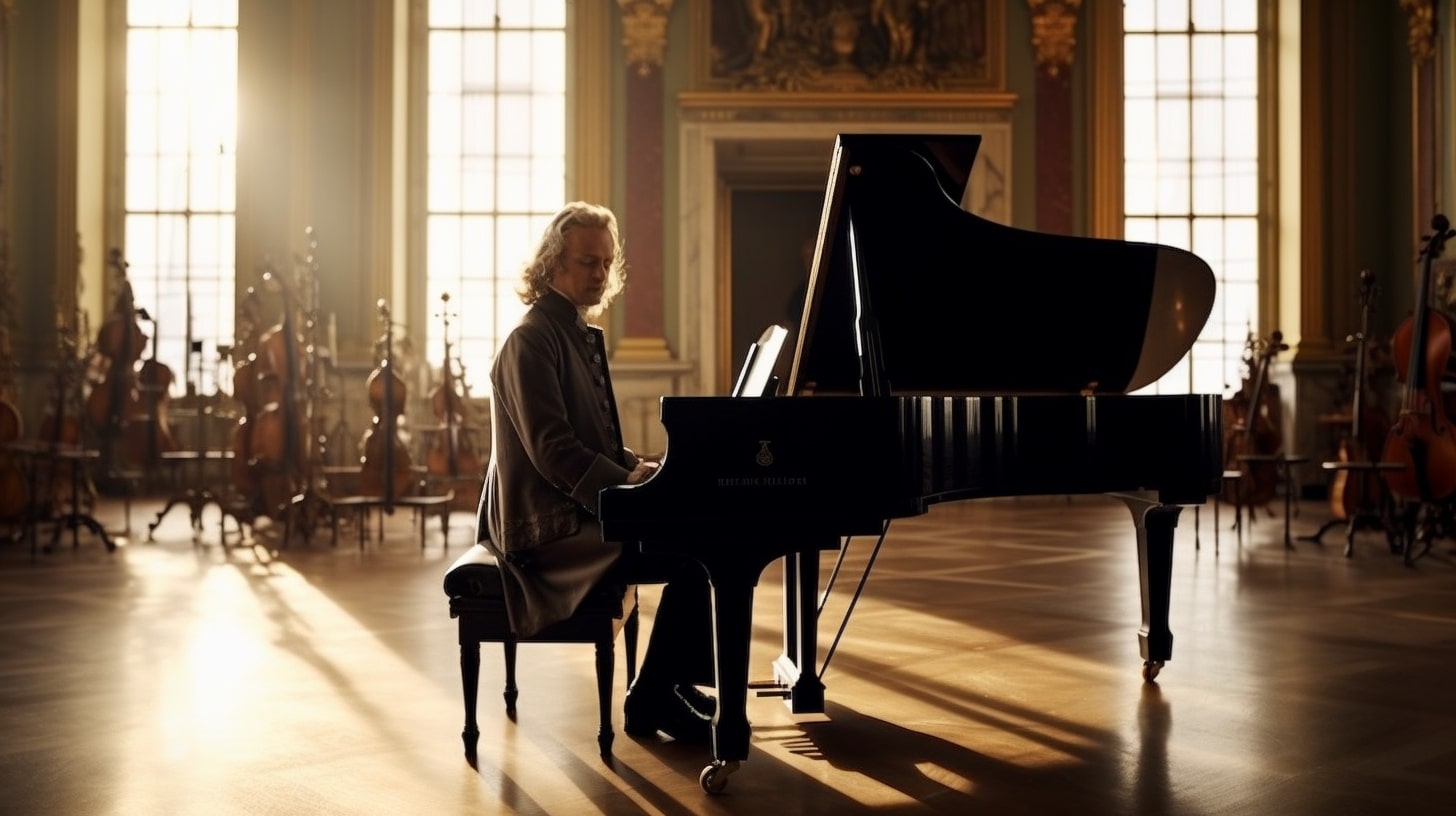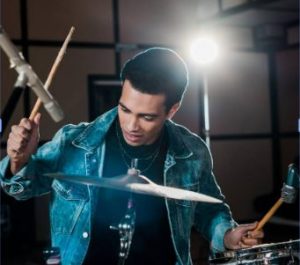Johann Sebastian Bach, a renowned composer of the Baroque era, was a virtuoso on multiple instruments. Throughout his life, he created numerous works in various genres, composing for both chamber music and orchestras.
Bach’s extensive body of work encompassed compositions for organ, other keyboard instruments, violin, and harpsichord concertos, demonstrating his exceptional versatility as a musician.
Contents
Bach’s Early Life and Background
Born in Eisenach, Germany
Johann Sebastian Bach was born on March 21, 1685, in Eisenach, Thuringia, Germany. He was the eighth and youngest child of a musical family. Eisenach has a rich history and deep connection to the German Lutheran tradition.
Family of Musicians
The Bach family was renowned for their musical talents. Over a period of 200 years, the Bach lineage produced more than 50 musicians and composers. This musical pedigree laid a strong foundation for Johann Sebastian Bach’s expertise and passion in the field of music.
Johann Ambrosius Bach: Father and Mentor
Johann Ambrosius Bach, the father of Johann Sebastian Bach, was a talented musician, violinist, and trumpeter. He was the master of town musicians, holding a respectable position in Eisenach. Johann Ambrosius played a pivotal role in the musical upbringing of his son, providing guidance and support in his early years.
Education in Ohrdruf and Lüneburg
After the death of his parents, Bach moved to Ohrdruf to live with his older brother, Johann Christoph Bach. In Ohrdruf, Bach was exposed to a thorough musical education that enhanced his understanding of traditional forms and hymns of the orthodox Lutheran service.
Later, he moved to Lüneburg, where he continued his education at the renowned St. Michael’s School. There, he acquired a deep knowledge of the organ, harpsichord, and violin under the direction of various prominent musicians of the time.
In conclusion, Johann Sebastian Bach’s early life and background were characterized by a rich musical environment, an artistic family legacy, and education under the guidance of skilled mentors. This combination of factors significantly influenced his journey to becoming one of the most celebrated composers in history.
Bach’s Musical Instruments
Organ
Johann Sebastian Bach was renowned for his skill and proficiency with the organ. He played the instrument throughout his career and even held various positions as an organist, such as at the churches of Arnstadt, Mühlhausen, Weimar, and Leipzig. Bach’s organ compositions include numerous preludes, fugues, and chorale settings, showcasing his deep understanding of the instrument.
Harpsichord and Clavichord
Besides the organ, Bach was also proficient at playing the harpsichord and clavichord. During his time at the courts of Weimar and Köthen, Bach composed various works for the harpsichord, such as his renowned Inventions and Sinfonias and the Well-Tempered Clavier, which could be played on any keyboard instrument of the time, including the harpsichord, clavichord, and organ. The clavichord allowed for more expressiveness and dynamic control than the harpsichord, while the harpsichord offered a crisp, robust sound.
Violin and Viola
In addition to his keyboard-playing skills, Bach played both the violin and viola. He started playing the violin at a young age and was influenced by his family members, who were also musicians.
As the concertmaster at the Weimar court, Bach composed and performed several violin concertos, solo works, and orchestral suites, highlighting his extensive understanding of string instruments.
Other Instrumental Proficiencies
Bach was skilled in playing various instruments, including the horn, brass, contrabass, cello, oboe, bassoon, flute, recorder, and trumpet. However, these instruments did not receive the same level of prominence in his compositions as the organ, harpsichord, and violin.
An interesting fact is that Bach’s favorite instrument was actually the lautenwerck, a keyboard instrument resembling a harpsichord but with gut strings that produced a sound similar to that of a lute.
In conclusion, Johann Sebastian Bach was a highly proficient and versatile musician, skilled in playing numerous instruments. While the organ was his main instrument, his facility, and understanding of various other instruments greatly influenced his compositional style and the rich range of works that have become a cornerstone of the Western classical music tradition.
Bach’s Career and Compositions
Weimar Years and Prince Leopold
Johann Sebastian Bach, a renowned Baroque-era composer, held various positions throughout his career. During his time in Weimar, he primarily worked as an organist, focusing on compositions for the organ.
Bach served as a court organist and violinist for Prince Leopold of Cöthen. Under Leopold’s patronage, Bach composed some of his most famous works, such as his Brandenburg Concertos and various cantatas.
Cöthen and Maria Barbara Bach
In 1717, Bach moved to Cöthe,n where he became Kapellmeister, or director of music, for Prince Leopold. This period marked a shift in his musical focus from organ works to instrumental music. Bach excelled in creating chamber music, including sonatas, suites, and partitas for various instruments like the violin, cello, and keyboard.
During his time in Cöthen, Bach was married to his first wife, Maria Barbara Bach. Their marriage produced several musicians who continued the Bach family legacy.
Leipzig and Anna Magdalena
In 1723, Bach accepted the position of Cantor at the St. Thomas Church and School in Leipzig. This role required him to compose for the church, leading to the creation of some of his most esteemed sacred works, such as the Mass in B Minor and the St. Matthew Passion. During his tenure in Leipzig, Bach married his second wife, Anna Magdalena.
Legacy and Death
Bach continued to be an influential musician and composer until his death in 1750. His extensive compositions set an extraordinary standard for future musicians, including Wolfgang Amadeus Mozart and Ludwig van Beethoven. Celebrated for his intricate and expressive works, Bach’s contributions to the Baroque era remain a testament to his exceptional skill and creativity.
Johann Sebastian Bach played numerous instruments throughout his career, some of which include:
- Violin
- Horn
- Brass
- Contrabass
- Cello
- Oboe
- Bassoon
- Flute
- Recorder
Known for continually expanding his mastery of various instruments, Bach is often remembered as one of the greatest musicians and composers in history.
Influence on the World of Music
Bach’s Contemporaries
Johann Sebastian Bach was greatly influenced by local organist George Böhm and fellow composer Dieterich Buxtehude.
In his early career, Bach landed his first job as a musician at the court of Duke Johann Ernst in Weimar, where he honed his skills by exploring various musical styles. Bach’s music during this period was heavily inspired by contemporary Italian opera and composers such as Antonio Vivaldi, leading him to incorporate new styles and forms in his compositions.
Impact on Later Composers
Bach’s music significantly impacted the development of classical music, not only in his native Germany but also across Europe. His mastery of counterpoint and ability to seamlessly weave intricate melodies together inspired composers like Ludwig van Beethoven. One of Bach’s famous students, Johann Christoph Bach, also significantly influenced the music scene during their time. Johann Sebastian Bach’s compositions, such as The Well-Tempered Clavier, Partitas for Solo Violin, and Italian Concerto, served as essential resources for many composers who sought to learn and follow in his footsteps.
Bach’s role as a Kapellmeister in the court of Weimar and later Leipzig, Germany, allowed his music to spread throughout the region. The compositions he created during his tenure at the St. Thomas School in Leipzig, including the Goldberg Variations and Musical Offering, further solidified his impact on the evolution of classical music.
Bach’s Music in Modern Times
To this day, Johann Sebastian Bach’s influence is still apparent in the world of music. His work has left a mark on various genres, such as pop music and jazz, with his distinct melodies often incorporated into contemporary musical pieces. Bach’s compositions continue to be performed, studied, and adapted for various instruments, showcasing the universal appeal of his work.
Even in the modern setting of Saxony, Bach’s music remains an integral part of the area’s cultural heritage. The lasting impact of his compositions highlights his extraordinary talent and profound contribution to the development of Western music.


